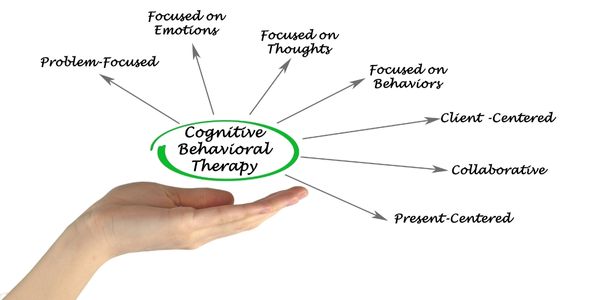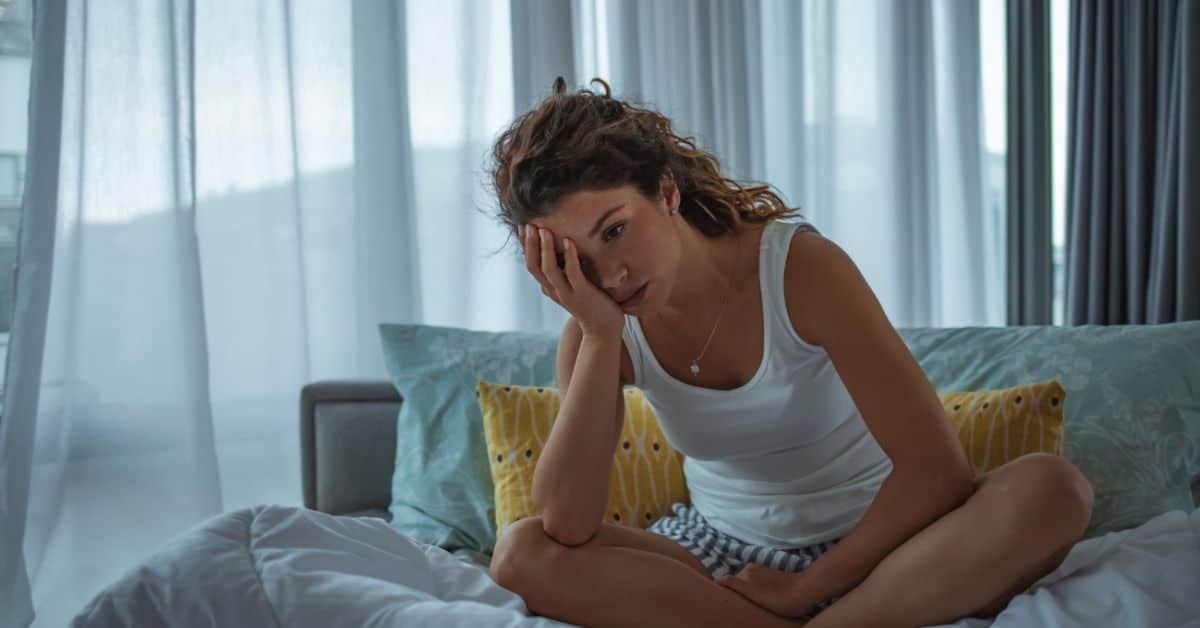What Is Insomnia?
Insomnia like other sleep disorders affects millions of people worldwide.
It is characterized by trouble sleeping, difficulty falling or staying asleep, waking up frequently during the night, or waking up too early in the morning.
This leads to a lack of restful sleep and can have a significant impact on a person’s overall well-being, mental health, and quality of life.
The term “insomnia” comes from the Latin word “insomnus,” meaning “without sleep.”
Insomnia is one of a number of sleep disorders that can be caused by a variety of factors, including stress, anxiety, depression, medical conditions, certain medications, and lifestyle habits.
Symptoms Of Insomnia

Some common signs of insomnia include difficulty falling asleep, waking up frequently during the night, difficulty returning to sleep, waking up too early in the morning, and feeling tired or groggy during the day.
This can have a huge effect on mental health.
Other symptoms can include irritability, decreased concentration, memory problems, and decreased productivity.
Insomnia can be a vicious cycle, as the lack of sleep can lead to increased stress and anxiety, making it even harder to fall asleep.
It is important to address the underlying cause of insomnia to effectively treat the condition.
What Is Insomnia Caused By?
Insomnia can be caused by a variety of factors, including stress, anxiety, depression, medical conditions, certain medications, and lifestyle habits.
The underlying cause of insomnia will vary from person to person and must be addressed in order to effectively treat the condition.
Lifestyle Changes
This may involve making changes to lifestyle habits, such as reducing caffeine and alcohol consumption which can upset your sleep cycle, establishing a regular sleep schedule, and reducing exposure to screens before bedtime.
In some cases, medical treatment may also be necessary, such as prescription sleep aids or behavioral therapy.
Insomnia Signs
The signs of insomnia can include difficulty getting to sleep, waking up frequently during the night, difficulty returning to sleep, waking up too early in the morning, and feeling tired or groggy during the day.
Other signs can include irritability, decreased concentration, memory, and decreased productivity.
This can all have a poor effect on mental health.
Insomnia Treatment And Causes

Insomnia is a sleep disorder that affects millions of people worldwide.
It is characterized by difficulty falling or staying asleep, waking up frequently during the night, or waking up too early in the morning.
This leads to a lack of restful sleep and can have a significant impact on a person’s overall well-being and quality of life.
The term “insomnia” comes from the Latin word “insomnus,” meaning “without sleep.” Insomnia is considered a symptom, not a standalone condition.
It can be caused by a variety of factors, including stress, anxiety, depression, medical conditions, certain medications, and lifestyle habits.
There are two types of insomnia: acute and chronic.
Acute insomnia is a short-term condition that lasts for a few days to a few weeks.
It is often caused by temporary stressors, such as an upcoming exam or a life event.
Chronic insomnia, on the other hand, lasts for at least three nights a week for a period of three months or more.
Some common signs of insomnia include problems falling asleep, waking up frequently during the night, difficulty returning to sleep, waking up too early in the morning, and feeling tired or groggy during the day.
Insomnia can be a vicious cycle, as the lack of sleep can lead to increased stress and anxiety, making it even harder to fall asleep.
It is important to address the underlying cause of insomnia to effectively treat the condition.
This may involve making changes to lifestyle habits, such as reducing caffeine and alcohol consumption, establishing a regular sleep schedule, and reducing exposure to screens before bedtime.
In some cases, medical treatment may also be necessary, such as prescription sleep aids or behavioral therapy.
This can also help to rule out other sleep disorders.
Non-Medication-based Treatments For Insomnia

Chronic insomnia can have a significant impact on a person’s quality of life and overall well-being.
The good news is that there are several effective treatments for insomnia and chronic insomnia symptoms, including both medication and non-medication options.
In this section, we will explore different methods of treating insomnia, including natural methods for curing insomnia.
- Cognitive-Behavioral Therapy for Insomnia (CBT-I)
- Cognitive-behavioral therapy for insomnia (CBT-I) is a type of therapy that focuses on changing the thoughts and behaviors that contribute to insomnia.
- CBT-I can be used to help individuals develop better sleep habits, reduce anxiety and stress, and improve sleep quality.
- This type of therapy is considered a first-line treatment for insomnia and has been shown to be effective in reducing symptoms and improving sleep.
- CBT-I can be done on an individual basis with a therapist or in a group setting.
Meditation For Insomnia & Relaxation Techniques

Relaxation techniques, such as deep breathing, progressive muscle relaxation, and meditation, can help reduce stress and anxiety, leading to improved sleep.
These techniques work by calming the mind and relaxing the body, which can make it easier to get to sleep and stay asleep.
Relaxation techniques can be done at bedtime or anytime during the day to help reduce stress and promote better sleep.
You can find out more about Meditation in our recent article.
Exercise Can Help With Insomnia

Regular exercise has been shown to improve sleep quality and reduce symptoms of insomnia. Exercise can help regulate the body’s sleep-wake cycle and promote better sleep by reducing stress and anxiety.
Exercise should be done regularly, but it is best to avoid strenuous exercise close to bedtime, as this can make it more difficult to get to sleep.
Sleep Hygiene
Sleep hygiene refers to the habits and routines that can promote better sleep.
Good sleep hygiene includes maintaining a regular sleep schedule, avoiding caffeine and alcohol before bedtime, and creating a comfortable sleep environment.
Other tips for good sleep hygiene include avoiding electronics before bedtime, keeping the bedroom cool and dark, and using a comfortable mattress and pillows.
Sleep Aiding Herbal Supplements
Herbal supplements, such as valerian root, passionflower, and chamomile, have been used for centuries for sleep problems and to promote relaxation and improve sleep.
Valerian root has been shown to reduce the time it takes to get to sleep, while passionflower has been used to reduce anxiety and promote better sleep.
Chamomile is commonly used as a natural sleep aid and has been shown to reduce symptoms of insomnia.
Herbal supplements are available in many forms, including teas, capsules, and tinctures.
It is important to speak with a healthcare provider before taking any herbal supplements, as they can interact with medications and may have side effects.
Try Essential Oils For Insomnia
Essential oils, such as lavender and bergamot, have been used for their calming and relaxing properties.
Aromatherapy using essential oils can be done by adding a few drops of the oil to a diffuser, applying it to the skin, or adding it to bathwater.
The aroma of the oil can help promote relaxation and reduce stress and anxiety, leading to better sleep.
How Acupuncture Can Help Insomnia

Acupuncture is a traditional Chinese medicine technique that involves inserting thin needles into specific points on the body.
Acupuncture has been used to treat a variety of health conditions, including insomnia.
The theory behind acupuncture for insomnia is that it can help balance the body’s energy and reduce stress and anxiety, leading to better sleep.
Yoga & Tai Chi Can Help With Insomnia

Yoga and Tai Chi are forms of exercise that combine physical movement with mindfulness and meditation.
These exercises have been shown to improve sleep quality and reduce symptoms of insomnia by reducing stress and anxiety.
Both yoga and Tai Chi can be done in a class setting or at home and can be a natural and effective way to treat insomnia.
Insomnia is a common disorder that can have a significant impact on a person’s quality of life.
There are many effective treatments for insomnia, including medication-based and non-medication-based options, as well as natural methods for curing insomnia.
The best treatment for insomnia will vary from person to person and may involve a combination of different treatments.
If you are experiencing symptoms of insomnia, it is important to speak with a healthcare provider to determine the best course of treatment.
With the right treatment, it is possible to improve sleep quality and reduce symptoms of insomnia.
Medication-based Treatments For Insomnia:
Sleep Medicines & Medications (Seek professional medical advice)

Sleep medications, also known as hypnotics, are the most commonly prescribed treatment for insomnia.
Please seek medical advice with regard to any sleep medication.
This can also help rule out other sleep disorders.
Antidepressants can also be used to treat insomnia.
While these medications are typically used to treat depression, they can also help with insomnia symptoms.
Antidepressants can be used in two ways to treat insomnia.
The first is to use a low dose of an antidepressant as a sleep aid, and the second is to use an antidepressant that is specifically approved for treating insomnia.
Please seek medical advice, this can also help rule out other sleep disorders.
Keep A Sleep Diary To Monitor Insomnia
Keeping a sleep diary is a useful tool for tracking sleep patterns and identifying factors that may be affecting the quality of your sleep.
In the diary, you can record the time you go to bed and wake up, the length and quality of your sleep, and any events or activities that may have impacted your sleep, such as caffeine or alcohol consumption, stress levels, and physical activity.
By keeping a sleep diary for several weeks, you can gain insight into your sleeping habits and patterns, and identify areas for improvement.
This information can also be helpful for healthcare professionals in diagnosing and treating sleep disorders.
Additionally, tracking your sleep in a sleep diary can help you see the impact of changes you make to improve your sleep, such as adjusting your bedtime routine or modifying your sleep environment.
Common Questions About Insomnia
What is chronic insomnia?
Chronic insomnia is a sleep disorder characterized by difficulty falling asleep or staying asleep, even when a person has the opportunity for adequate sleep.
It can last for a minimum of three nights a week for three months or longer.
This persistent sleep disruption can lead to excessive daytime sleepiness, decreased concentration and productivity, mood changes, and a weakened immune system.
Chronic insomnia can be caused by various factors such as stress, anxiety, depression, medical conditions, and unhealthy sleeping habits.
Treatment options include behavioral therapy, prescription sleep aids, and lifestyle changes such as maintaining a consistent sleep schedule, creating a relaxing bedtime routine, and avoiding stimulants close to bedtime.
Consulting with a doctor is recommended for proper diagnosis and effective management of chronic insomnia and other sleep disorders and sleep problems.
What is an insomniac?
An insomniac is a person who suffers from insomnia, a sleep disorder characterized by difficulty getting to sleep, staying asleep, or getting restful sleep.
Insomnia causes?
The causes of insomnia can vary and can include stress, anxiety, depression, medical conditions, certain medications, and lifestyle habits.
It is important to address the underlying cause of insomnia in order to effectively treat the condition.
What is it called when you can’t sleep?
When a person is unable to fall asleep, stay asleep, or get restful sleep, it is commonly referred to as insomnia.
How much sleep should I be getting per night?
The amount of sleep a person needs can vary depending on their age, lifestyle, and overall health.
However, the following guidelines provide a general idea of a good night’s sleep and the recommended amount of sleep for different age groups:
- Adults (18-64 years old): 7-9 hours
- Older adults (65+ years old): 7-8 hours
- Teenagers (14-17 years old): 8-10 hours
- School-age children (6-13 years old): 9-11 hours
- Preschoolers (3-5 years old): 10-13 hours
- Toddlers (1-2 years old): 11-14 hours
- Infants (4-11 months old): 12-15 hours
- Newborns (0-3 months old): 14-17 hours
It’s important to remember that these are general guidelines on how much sleep we should get, and the ideal amount of sleep for each individual may vary.
If you have difficulty sleeping or are consistently feeling tired during the day, it’s recommended to consult with a healthcare professional to determine if you have a sleep disorder and to discuss treatment options.
What is the meaning of insomnia?
The term “insomnia” comes from the Latin word “insomnus,” meaning “without sleep.”
It is a term used to describe a sleep disorder that affects an individual’s ability to fall asleep, stay asleep, or get restful sleep.
Can ADHD cause insomnia?
Yes, Attention Deficit Hyperactivity Disorder (ADHD) can cause insomnia. People with ADHD often have difficulty falling asleep and staying asleep, leading to chronic sleep deprivation.
This can be due to several factors, including hyperactivity, impulsiveness, and racing thoughts, which can make it difficult to calm the mind and fall asleep. In addition, certain medications used to treat ADHD can also interfere with sleep patterns.
If you have ADHD and are experiencing insomnia, it’s recommended to consult with a healthcare professional to determine the best course of treatment, which may involve a combination of medication and lifestyle changes to improve sleep hygiene and regulate sleep patterns.
How do u know if u have insomnia?
Some signs and symptoms of insomnia include:
- Difficulty getting to sleep or staying asleep
- Waking up frequently during the night
- Waking up too early in the morning
- Feeling tired or groggy during the day
- Difficulty concentrating or staying focused
- Feeling irritable, depressed, or anxious
- Reduced performance at work or school
- Avoiding social activities due to lack of energy or fatigue
If you have persistent sleep difficulties for at least three nights a week for a minimum of three months, you should consult with a healthcare professional to determine if you have insomnia.
They will ask you about your sleep patterns, lifestyle habits, and any underlying medical conditions that could be contributing to your symptoms.
A sleep study may also be recommended to help diagnose the problem.
What are the main causes of insomnia?
Insomnia can be caused by a variety of factors, including:
- Stress and anxiety: Stressful events and worries can make it difficult to fall asleep and stay asleep.
- Medical conditions: Certain medical conditions, such as chronic pain, acid reflux, and heart disease, can cause insomnia.
- Medications: Some medications, such as those used for depression, ADHD, and high blood pressure, can cause insomnia.
- Substance use: Alcohol, caffeine, and nicotine can disrupt sleep patterns and cause insomnia.
- Environmental factors: Noise, light, and temperature changes can make it difficult to fall asleep and stay asleep.
- Poor sleep habits: Irregular sleeping patterns, napping during the day, and using electronic devices before bedtime can interfere with sleep quality.
- Shift work: People who work irregular or night shifts may experience insomnia due to disruption of their sleep-wake cycle.
It’s important to note that insomnia can also be a symptom of a larger underlying medical or psychiatric condition, such as depression, anxiety, ADHD, or bipolar disorder.
If you have persistent difficulty sleeping, it’s recommended to consult with a healthcare professional to determine the cause and best course of treatment.
How can I stop my insomnia?
There are several lifestyle changes and treatments that can help you stop your insomnia and get a good night’s sleep, including;
- Making sure you get sufficient exercise during the day.
- Avoiding caffeine and nicotine close to bedtime.
- Implementing a regular sleep schedule.
- Limiting or avoiding alcohol intake before bedtime.
- Practicing relaxation techniques such as deep breathing or yoga prior to going to bed.
- Avoiding big meals and exercising close to bedtime.
- Creating an environment in your bedroom that is conducive to sleeping (cool, dark, quiet).
If these strategies don’t work, talk to your doctor about further treatment options.
What is the main cause of insomnia?
The main cause of insomnia is often linked to stress and anxiety.
Other potential causes include lifestyle factors such as unhealthy sleep habits (e.g., irregular rhythms, over-stimulating activities before bedtime), medical conditions (e.g., thyroid issues, depression, or chronic pain), and certain medications.
To address the root cause of insomnia, consult with a physician for an appropriate diagnosis and treatment plan tailored to your individual needs.
What are 5 insomnia symptoms?
Five symptoms of insomnia are difficulty falling asleep, waking often during the night, waking up too early in the morning and feeling tired, having a hard time focusing or concentrating throughout the day due to lack of sleep, and having low energy throughout the day.
These symptoms can be caused by stress, diet, or health issues. It may also be caused by certain medications or stimulants such as caffeine.
Insomnia typically requires medical attention in order for patients to find relief.
How many hours of sleep is insomnia?
Insomnia is characterized by difficulty in falling asleep or staying asleep for a minimum of three nights per week for at least three months.
It can involve sleeping fewer than the recommended number of hours (generally 7-9) or waking up too early and not being able to fall back asleep.
Insomnia can last days, weeks, or even longer if left untreated.
What causes insomnia in females?
There are many potential causes of insomnia in females, including;
- Stress.
- Anxiety.
- Depression.
- Hormonal changes or imbalances due to menstruation, pregnancy, and menopause.
- Certain medications.
- Physical illnesses such as pain or digestive disorders.
- Environmental factors like noise, light, and temperature.
- Lifestyle factors such as irregular work schedules or caffeine, alcohol, and nicotine consumption.
Treatments may include cognitive behavioral therapy (CBT), relaxation techniques, dietary changes, and medications.
It’s important to consult with a doctor to determine the cause before attempting any treatments.
What does insomnia do to a person?
Insomnia can have a significant impact on a person’s physical and mental health. It can lead to exhaustion, poor concentration, irritability, depression, and anxiety.
Insomnia also affects your immune system, making you more vulnerable to illnesses such as colds and flu.
Chronic insomnia can even increase the risk of developing high blood pressure, diabetes, and heart disease.
Additionally, people with insomnia often report having trouble learning new information or low productivity at work due to lack of sleep.
Can you have insomnia for no reason?
In some cases, a person can experience insomnia without any identifiable underlying cause. This is referred to as primary insomnia.
Primary insomnia is not a symptom of another medical or psychiatric condition and can be caused by stress, lifestyle changes, irregular sleep habits, and other factors.
If you have persistent problems sleeping, it’s always a good idea to consult with a healthcare professional to rule out any underlying medical conditions and to determine the best course of treatment.

